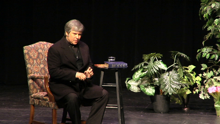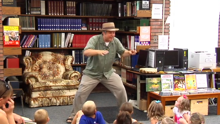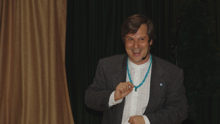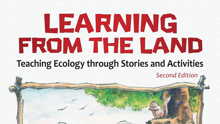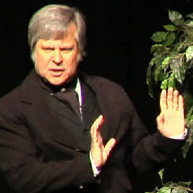Some Thoughts on Cultural Cosmology By Brian “Fox” Ellis
This article appeared in the Northlands’ Storytelling Magazine. It originally appeared as the director’s notes in the playbill of Black Hawk’s Band: A Native View of Prairie History. This musical theater production featured storytellers Jo Lakota and Brian “Fox” Ellis, Singer/Songwriter Barry Cloyd, and the Eagle Ridge Singers, a local Native American Drum. The show has been performed at several regional theaters and is on tour next winter. For more information about hosting a performance please visit our web page: Prairie Folklore Theatre

Several years ago I put together a performance of stories that answered the question I am most often asked: “So Fox, how did you get your name?” Being entirely autobiographical, I began with the beginning and told a creation myth about a fox singing the world into being, that the world was made of song. I wove in a traditional fox fable. I then told stories about my family tree and Great Uncle Johnny, who was half Cherokee and had a pet fox. Only at the end of the hour did I tell a personal story about my pet fox and the dream in which I was given my name. All of this to say: Who we are is a collage of family stories and cultural cosmology, who we are, are the stories we tell.
“I” am a collection of folktales and my culture’s mythology. “I” am a patchwork quilt of family stories and the ego part of who I am is just a small part of the whole picture.
Thinking this was a clever and original idea, I was deeply humbled and amazed to find that Geronimo had done the same thing when interviewed for his biography one hundred years earlier. He began with the creation myth of the Apache, told of his tribe’s history and only at the end told of his birth and personal adventures.
The Cherokee author of The Witch of Going Snake and Other Stories, created a fictional “Biography of Yellow Bird” that also began with a creation myth, covered the trail of tears and ended with just a few paragraphs of this man’s existence. Black Hawk, too, began his autobiography with several pages about his family tree, his grandfather’s vision of the coming of the white man, and his tribe’s history of migration from the Atlantic Coast, through the Northern Great Lakes to the Mississippi Valley.
These storytellers could not separate their individual lives from the ongoing story of creation.
This tradition of seeing one’s self in this larger context is ancient and yet somehow missing from our modern understanding of the Self. Our Creation Myth is an integral part of our personal narrative. What is our personal story in light of our cultural history? How do our parents and great-grandparents still influence our choices? How does our cultural myth color our daily decisions? How can we act as the hands and mind of Creator? What are the future implications of today’s actions? How will our lives influence the next seven generations? (If you can answer any of these questions please let me know, soon!)
It is through our stories that we know this larger self and our place within the cosmos. It is through our family stories that we keep our ancestors alive. Simon Ortiz, a Pueblo storyteller, once said that our creation stories say more about us than about creation, yet the world may not be fully made if we do not tell the stories of creation.
There was a time in every culture in which the old stories, poetry and ballads provided the moral compass of our lives. Myths and legends gave us guidance for living our dreams, facing our fears, and coping with tragedy. Any scholar of history, folk music and mythology will affirm the multifaceted ways in which cultural myths both influence and interpret history.
In this piece of musical theater performed by Prairie Folklore Theatre we celebrate an important chapter in our collective story.
Imagine sitting around a campfire with Blackhawk and his friends sharing creation myths and history, fancy dancing and drumming songs. The audience is invited to be a part of the evening’s celebration, a celebration of an undying spirit that inhabits the land where Black Hawk once roamed and his descendants still thrive. (Black Hawk’s great-great granddaughter came to the opening night; I was grateful she did not tell us she was there until after the show. She did say she felt the presence of her ancestors in the re-telling of the tales.)
The goal in this production is to welcome the audience into our circle, to be a part of our celebration. Our hope is that our stories and songs will transport us back into the 1830’s to drink from this shared cup of wisdom. We are not actors and actresses; we are your friends and relatives. We are not pretending; we are sharing the stories from our collective past.
The show begins with a fanciful meeting of Black Hawk and his band of warriors on their way into Illinois to plant corn in violation of an unjust treaty. We share a feast and pass the night telling stories. There is the story of “Grandma Turtle” making the Earth and “How the Spring Peepers Wake Up Spring.” We tell the story of the Fox Indians’ migration, their exploits in war and their annual cycle of ceremonies. We discuss scalping and corn planting. There are drumming songs and social dances. In one recent performance more than two-thirds of the audience participated in the dancing and most everyone sang along with several chants. The script is taken largely from Black Hawk’s autobiography, first published in 1834.
Black Hawk was a heroic character fully aware of his role in history, yet his autobiography is an unpretentious account of his selfless service to his people. He truly risked his life, often, to save his people and preserve his culture. Like Grandma Turtle, who swam to the bottom of the ocean to get mud for Turtle Island, he knew “that all life gives to life and that is how life is to be lived.” Like the Spring Peeper, he knew his humble efforts, multiplied by his clansmen, could wake up the world from its hibernation. He knew the stories of his ancestors not as folklore but as a source of strength and direction, his ancestors stood over his shoulder, whispered in his ear… just as his descendents faces were pushing up from the ground before him.
Like all great historical drama, our goal is to tell a personal story that illuminates a broader canvas, to share a universal idea within the context of a particular moment in time. The goal is to challenge myself, the performers and the audience to see our lives reflected anew in this bright light from history.
This story is our story. My great-great grandma was full blood Cherokee and great-great grandpa was Scots – Irish. Your ancestors are living with us as immigrants and as natives, toiling in you for a better world. Your ancestors are toiling in you for their great grand children.
In researching and writing “Black Hawk’s Band” I kept asking myself, what can we learn from Black Hawk that will give future generations both strength and inspiration? What can learn from our story that inspires us to make the world a better place? How can our stories help us to be better humans?
In writing and producing this musical I was stunned by the ways in which 1000 year old stories prophesied the future. I was inspired by the fortitude of my ancestors and the way they used music and myth to glean meaning from their lives. I was also awestruck by the ways these old stories were relevant to current issues.
Time is a circle, not a line, the present, past and future overlap.
